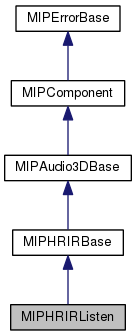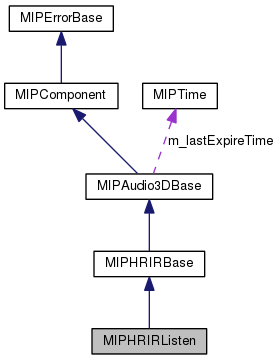Creates 3D sound based on HRIR info from the LISTEN project. More...
#include <miphrirlisten.h>
Inheritance diagram for MIPHRIRListen:

Collaboration diagram for MIPHRIRListen:

Public Member Functions | |
| bool | init (const std::string &baseDirectory, int maxFilterLength=48, bool allowAmbientSound=true, bool useDistance=true) |
| Initializes the component. | |
| bool | destroy () |
| De-initializes the component. | |
| bool | selectHRIRSet (int subjectNumber, bool compensated=true) |
| Select a specific HRIR data set. | |
| int | getSamplingRate () const |
| Returns the sampling rate which is used by this component. | |
| bool | getSubjectNumbers (std::list< int > &subjectNumbers, bool compensated=true) |
| Returns a list of the available subject numbers. | |
Detailed Description
Using this component, raw floating point mono audio messages can be converted into stereo raw floating point audio messages. The sound in the output messages will have a 3D effect, based upon your own location and the location of the sound source.
Member Function Documentation
| bool MIPHRIRListen::destroy | ( | ) |
| int MIPHRIRListen::getSamplingRate | ( | ) | const [inline] |
| bool MIPHRIRListen::getSubjectNumbers | ( | std::list< int > & | subjectNumbers, |
| bool | compensated = true |
||
| ) |
| bool MIPHRIRListen::init | ( | const std::string & | baseDirectory, |
| int | maxFilterLength = 48, |
||
| bool | allowAmbientSound = true, |
||
| bool | useDistance = true |
||
| ) |
This function initializes the 3D audio component.
- Parameters:
-
baseDirectory In this directory and its subdirectories, the component will look for WAV files containing data from the LISTEN project. maxFilterLength If larger than zero, only the first maxFilterLengthbytes of left and right filters are used in the convolution product. Can be used to make a tradeoff between 3D sound quality and CPU load.allowAmbientSound If set to false, messages corresponding to sources for which no positional information can be found are ignored. If set totrue, they're simply converted to stereo sound.useDistance If set to true, the distance of a source is used to adjust the sound amplitude.
| bool MIPHRIRListen::selectHRIRSet | ( | int | subjectNumber, |
| bool | compensated = true |
||
| ) |
When multiple HRIR data sets can be found in the base directory specified in the MIPHRIRListen::init function, this function can be used to select a specific set.
- Parameters:
-
subjectNumber The subject number belonging to a specific set. compensated Flag indicated if compensated data or raw data should be used.
The documentation for this class was generated from the following file:
- src/components/transform/miphrirlisten.h
 1.7.3
1.7.3